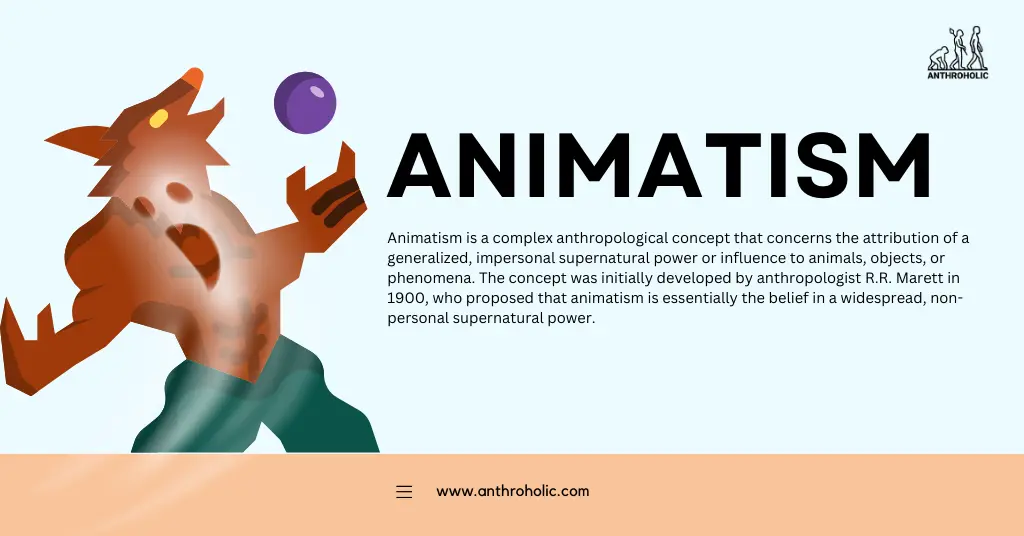AI Answer Evaluation Platform Live Now. Try Free Answer Evaluation Now
Animatism
Animatism is a complex anthropological concept that concerns the attribution of a generalized, impersonal supernatural power or influence to animals, objects, or phenomena. The concept was initially developed by anthropologist R.R. Marett in 1900, who proposed that animatism is essentially the belief in a widespread, non-personal supernatural power [1]. Animatism significantly differs from Animism – a belief in the existence of individual spirits that inhabit natural objects and phenomena.

Origin and Definition
Animatism originates from Latin “animatus”, indicating that it revolves around the belief in a diffuse, impersonal life force [1]. According to Marett, this life force, also known as “mana” in many cultures, is not associated with deities or specific entities but permeates all things and can be utilized or manipulated through certain rituals or practices [2].
- Animatism: Belief in a widespread, non-personal supernatural power or influence
- Mana: The impersonal supernatural force in many cultures, believed to be present in all things.
The above definitions underline the core principles of Animatism. It is not centered on personalized spirits or deities, but on a diffuse, impersonal supernatural power.
Manifestations of Animatism
Animatism is not confined to a single culture or society. Different societies worldwide have their interpretations and understandings of this concept, leading to various manifestations.
Polynesian Mana
In Polynesian cultures, the term “mana” refers to a supernatural force or power that individuals can acquire or lose based on their actions. It is often associated with personal success, strength, and authority. Importantly, mana is not personified or deified; instead, it flows through all things and can be transferred or manipulated [3].
Melanesian Magic
Melanesian societies in the Pacific have a concept similar to Polynesian mana, often associated with success in activities such as gardening, hunting, and warfare. Individuals or groups believed to possess this power are respected and feared, often sought after for their magical prowess [4].
African Nommo
In some African cultures, the concept of “nommo” is prevalent. It represents the power of the spoken word, believed to have the ability to create and change reality. Like mana, nommo is not personified; it is a force that one can manipulate through specific words or phrases.
The following table succinctly represents these various manifestations:
| Culture | Concept | Description |
|---|---|---|
| Polynesian | Mana | A supernatural power associated with personal success and authority |
| Melanesian | Magic | A powerful force related to success in various activities |
| African | Nommo | Power of the spoken word to influence reality |
The Role of Animatism in Culture
Animatism plays a significant role in many cultures, particularly in shaping social structures, belief systems, and rituals. People who are believed to have a higher degree of this impersonal power are often revered, feared, or both. They may hold positions of authority, conducting rituals, and leading ceremonies aimed at manipulating this power for the community’s benefit.
Animatism also influences morality in many societies. Actions believed to increase or decrease one’s impersonal power may be encouraged or discouraged, shaping the societal norms and taboos.
Conclusion
Animatism represents an important anthropological concept that underscores the diversity of human belief systems. By understanding the variations of this belief in different cultures, we can gain valuable insights into the intricate ways societies perceive and interact with the supernatural world.
References
[1] Marett, R.R. (1900). “Pre-animistic religion”. Folklore. 11 (2): 162–182.
[2] Keesing, R. M. (1984). “Rethinking ‘mana'”. Journal of Anthropological Research. 40 (1): 137–156.
[3] Shore, B. (1989). “Mana and Tapu”. In Cultural Psychology: Essays on Comparative Human Development. Cambridge University Press.
[4] Codrington, R. H. (1891). The Melanesians: Studies in their Anthropology and Folklore. Clarendon Press.




